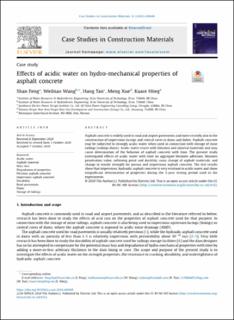Effects of acidic water on hydro-mechanical properties of asphalt concrete
| dc.contributor.author | Feng, Shan | |
| dc.contributor.author | Wang, Weibiao | |
| dc.contributor.author | Tan, Hang | |
| dc.contributor.author | Xue, Meng | |
| dc.contributor.author | Høeg, Kaare | |
| dc.date.accessioned | 2020-10-24T16:12:38Z | |
| dc.date.available | 2020-10-24T16:12:38Z | |
| dc.date.created | 2020-10-24T17:33:22Z | |
| dc.date.issued | 2020 | |
| dc.identifier.issn | 2214-5095 | |
| dc.identifier.uri | https://hdl.handle.net/11250/2684865 | |
| dc.description.abstract | Asphalt concrete is widely used in road and airport pavements and more recently also in the construction of impervious facings and central cores in dams and dykes. Asphalt concrete may be subjected to strongly acidic water when used in connection with storage of mine tailings (tailings dams). Acidic water reacts with bitumen and mineral materials and may cause deterioration of the behavior of asphalt concrete with time. The present study investigated effects of acidic water with time on aggregate-bitumen adhesion, bitumen penetration value, softening point and ductility, mass change of asphalt materials, and change in tensile strength for porous and impervious asphalt concrete. The test results show that impervious, hydraulic asphalt concrete is very resistant to acidic water and show insignificant deterioration of properties during the 3-year testing period used in the experiments. | |
| dc.language.iso | eng | |
| dc.title | Effects of acidic water on hydro-mechanical properties of asphalt concrete | |
| dc.type | Peer reviewed | |
| dc.type | Journal article | |
| dc.description.version | publishedVersion | |
| dc.source.journal | Case Studies in Construction Materials | |
| dc.identifier.doi | 10.1016/j.cscm.2020.e00445 | |
| dc.identifier.cristin | 1841945 | |
| cristin.ispublished | true | |
| cristin.fulltext | original | |
| cristin.qualitycode | 1 |
Tilhørende fil(er)
Denne innførselen finnes i følgende samling(er)
-
NGI articles [1024]
